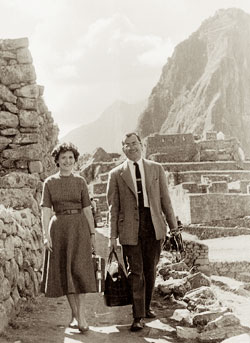

A publication of The Graduate School, University of North Carolina at Chapel Hill
Archives Spring 2001
Home | Back issues | About us | Email your feedback | The Graduate School | UNC-Chapel Hill | Make a gift
Teachers for Life
Even after retirement, professors continue to mentor their students
 |
| Photo courtesy of Charles and Shirley Weiss |
| Charles and Shirley Weiss explore the fabled lost Inca city of Manchu Picchu, August 1958. Charles was on a teaching and field assignment at the National Engineering University in Lima, Peru. That year, Shirley became the first female faculty member in the Department of City and Regional Planning. |
Using an imaginative combination
of cash gifts, charitable gift annuities and their wills, Charles and
Shirley Weiss created the Urban Livability Program at Carolina, which
provides support for an average of eight graduate students with various
research interests related to urban livability. The Weisses also started
separate endowments for 11 different academic programs at Carolina. Ultimately,
the Weisses will have given more than $1 million to Carolina.
Professors Emeriti Charles M. and Shirley F. Weiss have a rather large “University family.” So large, in fact, that it extends from one end of Carolina campus to the other. This husband and wife duo has influenced students and other faculty in their departments — indeed, all over campus — since they began their careers here.
Shirley, 80 this year, became
the first female faculty member in the Department of City and Regional
Planning in 1958. She retired in 1991. Charles, now 82, was a professor
of environmental biology from 1956 until his retirement in 1989.
The Weisses spent many years
here at UNC-Chapel Hill, but their longtime service only begins their
list of contributions to the community. More importantly, they have served
as mentors to their students, even after retirement.
“The most rewarding thing about teaching is seeing your students succeed,” Shirley said. “Our proudest moments are when we see how far they have progressed in their career choices.”
Charles agreed. “When
you’re teaching graduate students, you tend to work with much smaller
groups. In the end, these students become a part of your family,”
he explained.
Also fulfilling, they said,
was that they were instrumental in helping Carolina remove the gender
barrier in achieving equity in salary level and award of tenure.
“Times were changing in the mid 70’s,” Charles explained. “Congress passed affirmative action legislation. It took a while for the University to recognize that appointments had to be made ‘behind a screen,’ so to speak. Musicians are always chosen behind a screen — it’s the music that counts, not who’s playing the horn or the violin.”
It was 1973 when Shirley received her Ph.D. from Duke University in economics and was promoted to full professor —the very first female professor in her department. “Without Charles’ support, I would not have been able to do what I did,” she smiled. “I had support from mentors at Duke and Carolina.”
Shirley said she believes
it’s very important for graduate students to have role models. “Many
students who are now professors elsewhere will speak of how I helped them,”
she said. “I think in my case, being a woman and trying to make my
own way, made me more approachable or sympathetic. Students often come
and tell Charles how I counseled them in one way or another. They remember
— it’s rather amazing. They’ll say, ‘Shirley was my
teacher.’ That makes me feel ancient, but then very proud.”
Now retired, Charles and Shirley
Weiss are just as busy as they were as professors. They are worldwide
travelers, photojournalists of all their adventures, and lovers of education,
museums and the performing arts.
Closer to home, they established
the Weiss Urban Livability Program, a fellowship program designed to support
Carolina graduate students from various disciplines who are committed
to improving quality of life in contemporary communities. The Weisses
also provide
funding for 11 Carolina programs, including the Sonja Haynes Stone Black
Cultural Center, the Ackland Art Museum and the Morehead Planetarium.
“We formed the program
because of our shared interests and appreciation for the need for graduate
support,” Shirley said. She said the graduate students are the highlight
of the program, now in its ninth year. “It has been really remarkable.”
Charles and Shirley Weiss’
support and mentoring, which began almost half a century ago, continue
to touch students’ lives. “We want to provide support for current
and future generations of students to have the experience of multi-disciplinary
graduate study in this great University.”
-Nadia R. Watts
© 2002, The Graduate School, The University of
North Carolina at Chapel Hill
All text and images are property of The Graduate School
at the University of North Carolina-Chapel Hill. Contact Sandra Hoeflich
at shoeflic@email.unc.edu
to request permission for reproduction.
Contact Alexandra Obregon at aobregon@email.unc.edu if you have technical problems with this Web site.